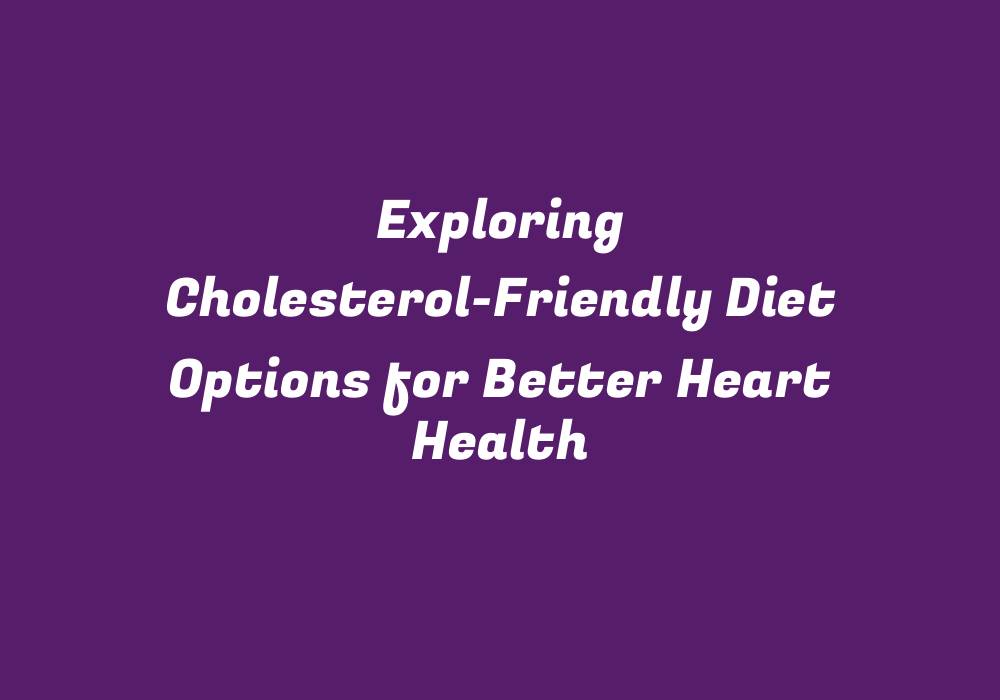Exploring Cholesterol-Friendly Diet Options for Better Heart Health
Introduction
Cholesterol is a waxy, fat-like substance present in every cell of our body. While it’s necessary for various functions like producing hormones and supporting the structure of cell membranes, excessive cholesterol levels can be detrimental to heart health. High cholesterol levels are associated with increased risks of heart disease and stroke. However, this doesn’t mean you have to avoid foods that contain fats altogether; some dietary changes can help lower your cholesterol intake while still providing essential nutrients for the body. This article will explore various cholesterol-friendly food options and tips to maintain heart health through a balanced diet.
Food Groups
1. Fruits and Vegetables
Incorporating more fruits and vegetables into your daily meals is an excellent way to maintain good heart health. These foods are rich in fiber, vitamins, minerals, and antioxidants that can help regulate blood pressure and reduce LDL (bad) cholesterol levels. Include a diverse range of fresh produce such as leafy greens, colorful bell peppers, citrus fruits, berries, and apples for optimal heart health benefits.
2. Whole Grains
Whole grains are an excellent source of complex carbohydrates, fiber, vitamins, and minerals. They can help improve blood sugar levels and reduce cholesterol. Swap refined grain products like white bread or pasta for whole-grain alternatives such as oatmeal, brown rice, quinoa, and whole-wheat pasta. These choices provide more sustained energy throughout the day while keeping your heart in good shape.
3. Low-fat Dairy Products
Dairy products can be a source of essential nutrients like calcium, protein, vitamin A, and B12. However, it is crucial to opt for low-fat or fat-free options to avoid excessive saturated fats that may contribute to increased cholesterol levels. Consider yogurt, skim milk, low-fat cheese, and soy products as cholesterol-friendly alternatives.
4. Fish
Fish is a great source of healthy proteins, omega-3 fatty acids, and vitamins that contribute to heart health. Omega-3s have been shown to reduce inflammation and lower triglyceride levels (another type of blood fat). Aim to consume fish at least twice a week, preferably varieties like salmon, tuna, and mackerel which are rich in omega-3s. For those who don’t eat fish, consider plant-based sources such as walnuts, flaxseed oil, chia seeds, or algae-derived supplements.
5. Nuts and Seeds
Nuts and seeds contain healthy fats and are a rich source of protein, fiber, vitamins, and minerals. They can provide essential nutrients while improving heart health. Include a variety of nuts like almonds, walnuts, and pistachios in your daily diet for added benefits. Seeds such as chia, flax, or hemp also offer similar advantages and can be easily incorporated into smoothies, salads, or cereals.
6. Legumes and Beans
Legumes are an excellent source of fiber, vitamins, minerals, and plant-based proteins. They have been shown to reduce LDL cholesterol levels while also providing essential nutrients for overall health. Incorporate a variety of legumes into your meals such as lentils, chickpeas, kidney beans, or black beans for better heart health.
7. Herbs and Spices
Using herbs and spices can add flavor to your dishes without adding extra calories or cholesterol. Certain herbs and spices have also been shown to have potential benefits for heart health, like garlic, ginger, cinnamon, turmeric, and oregano. These ingredients not only enhance the taste of your meals but may contribute to better cardiovascular wellness as well.
8. Healthy Fats
While it’s essential to avoid excessive saturated fats, unsaturated fats found in foods like avocados, olive oil, and nuts can actually help lower LDL cholesterol levels when consumed in moderation. Opt for plant-based oils such as extra virgin olive oil or grapeseed oil for cooking and dressings.
Tips for Maintaining Heart Health
1. Balanced Meals
Strive to have a balanced meal structure, including proteins, carbohydrates, healthy fats, and fiber-rich foods in each meal. This can help control blood sugar levels and keep your heart functioning optimally.
2. Limit Sodium Intake
Excessive sodium intake has been associated with increased risks of heart disease and high blood pressure. Try to limit processed or pre-packaged food items, as these often have a higher amount of salt. Instead, focus on cooking meals from scratch using herbs and spices for flavor enhancement.
3. Practice Mindful Eating
Slow down while eating and pay attention to your hunger cues. Being mindful can help prevent overeating and make better food choices based on hunger instead of emotions or stress. It’s also essential not to skip meals as this might lead to unhealthy snacking or binging later in the day.
4. Stay Hydrated
Drinking enough water daily is crucial for maintaining overall health, including heart health. Staying hydrated helps regulate blood pressure and circulation while keeping your body functioning efficiently.
5. Incorporate Regular Exercise
Exercise not only supports weight management but also improves heart health by strengthening the cardiovascular system. Aim for at least 30 minutes of moderate to vigorous physical activity most days of the week.
6. Maintain a Healthy Weight
Maintaining a healthy weight helps reduce the risk of heart disease and other related complications. Eat a balanced diet, exercise regularly, and keep track of your calorie intake to manage weight effectively.
7. Limit Alcohol Consumption
While moderate alcohol consumption may have some benefits for heart health, excessive drinking can lead to various issues that affect overall well-being. It’s important to be mindful of alcohol intake and follow the recommended guidelines for your gender.
Conclusion
Incorporating cholesterol-friendly food options into your diet and adopting healthy lifestyle habits can significantly impact your heart health. By making conscious choices and balancing nutrition with regular exercise, you’ll be well on your way to a healthier cardiovascular system while enjoying a delicious variety of foods.
